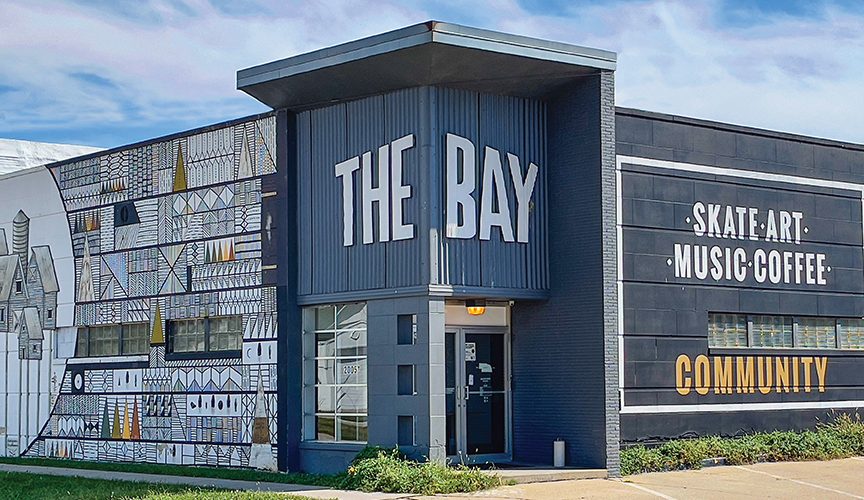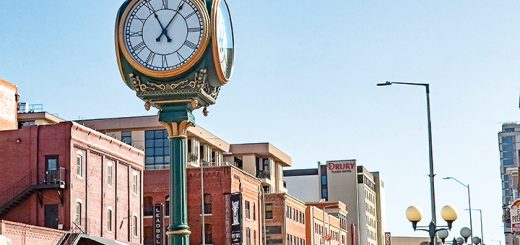High School Focus

by Julie Nichols, photography by Tom Tidball
Some say high school is a real zoo, and the flagship of Lincoln Public Schools’ high school focus programs, affectionately known as the Zoo School, takes it literally. Since 2000, this Science Focus Program located inside the Children’s Zoo has access to a living laboratory. The Zoo School recently unveiled its new $3.2 million building equipped with labs and classrooms. Students develop their own wildly varying capstone projects ranging from genome sequencing to animation or robotics, linguistic experiments, forest decomposition, to formulating fake blood spatter for forensic science simulations.
Focus programs yield the benefits of smaller communities, flexibility, experiential learning, individual support, greater self-expression, and stronger relationships with instructors. Creativity and critical thinking, experimentation, on-site training, and self-determination are all parts of focus programs. Different approaches to learning, alternative and specialty curricula, and more opportunity for exposure to out-of-school experiences lie within LPS.
Arts and Humanities Focus Program opened in 2006, offering visual artists, writers and performers a space to nourish creative projects in the arts and humanities. Open to freshmen through graduation, students who have passion, drive and curiosity can thrive in this tight-knit community. About the same time, Bryan Community School added a place for struggling students to reset their relationship to learning in an alternative setting with a high student/teacher ratio for support of individual academic needs. Bryan Community urges students on their unique journey, cultivates mutual respect while recognizing students’ individualism, and nurtures confidence, positive relationships, and self-reflection so that students connect to a future after graduation. Bryan provides daycare for student parents and mental health support through full time counsellors as a feature of its school community.
In 2015, Career Academy, a partnership with Southeast Community College, absorbed high school IT and entrepreneurship curricula and grew from four “career pathways” to 16 in five years. Students take dual credit courses focusing on criminal justice, health sciences, welding, precision machining, culinary arts, IT, education and human services among others, and graduate with college credits, industry certifications, and potential for apprenticeships and jobs. Although some career pathway courses may shift to new focus programs, Career Academy will likely add more offerings.
While focus programs aren’t a good fit for all, they can be perfect for students who excel in non-traditional environments, or who need more intimate learning communities. Some offer helpful structure, others freedom to explore. Free or low-cost college credit in focus high schools help students save tuition costs. LPS found that a broad majority of students who attend them love the focus program experience that goes beyond the walls of the classroom and encourages open views and discussions of both real-world issues and subjects they’re studying.
Focus programs essentially serve as learning extensions, and have been a point of LPS strategic planning. With two new high schools due to open, the success of the embedded International Baccalaureate program at Lincoln High and a junior ROTC within Northeast point to advantages of centering programs within home high schools where their peers also attend. Students have more opportunity to participate in activities. As a result of researching other similar programs nationwide, two embedded focus programs will officially open for the 2022-23 school year, plus one in an existing school, Northeast High.
In partnership with the University of Nebraska-Lincoln’s College of Agricultural Sciences and Natural Resources, Northeast students can study agricultural sciences and natural resources with concentration on food, energy, water and societal systems. Emphasis is placed on attracting a broad range of learners, not only those in hot pursuit of college degrees. Foundation STEM courses and field trips familiarize freshmen and sophomores with research facilities and the diversity of ag science and natural resource careers; juniors and seniors can take college level courses through UNL for credit if desired. Either way, graduates receive certifications based on demonstrated expertise in areas from conservation and ecology to crop production, competency in problem-solving and decision-making, critical thinking and STEM systems knowledge. With the proximity of the two campuses, hands-on experience is within easy reach.
When Lincoln Northwest’s doors open for the first time, so will The Medical Science Focus Program. A collaboration with Bryan College of Health Sciences (BCHS), this program prepares students for an array of medical fields. Integrating health sciences for interested freshmen and sophomores leads into BCHS college level courses for juniors and seniors. Students are paired with college-level mentors in their college coursework. With completion of requirements, students can receive phlebotomy, CNA and other certifications. Immersive experiences and shadowing opportunities ready students to enter healthcare jobs immediately in a time of growing need. College credit is available through reduced tuition and scholarships.
Bay High opens off-site in 2022 with the intent of nurturing alternative young creators and providing upward mobility for student innovators in emerging technologies. Instead of skipping homework to go to The Bay’s skate park, students will envision careers from the springboards of skateboarding, digital art, content creation and fashion. The Bay, founded in 2012, set out to provide community outreach for at-risk youth and a place for the self-identified “misfits” to gather. As a community nexus for youth, The Bay has already encouraged opportunities for kids to self-produce projects through a magazine (written and designed by kids), and a music venue (organized and staffed by youth) that showcases local young bands. Digital media and design, events marketing, video production, web design, photography and journalism are all fair game for students. Two LPS teachers will work alongside Bay staff (teaching artists) and the program will accept 50 juniors and 50 seniors.
A specialized focus program, Yankee Hill Learning Center offers a supportive environment for students struggling with learning and behavior, and encourages responsibility and social connections. Committed staff engage with every student’s individual needs through innovative teaching strategies that nurture academic and social successes, individual leadership and accountability. Yankee Hill. With recent additions of staff and students, this all-day school collaborates with families, parents and guardians, and outside agencies to help students succeed as adults.
Northstar High School piloted a few aviation classes to measure interest, sparked by passionate technical instructor Amanda Woodward, and inadvertently became an industry incubator. Enrollment grew from two students to 45, then nearly doubling despite the pandemic. Using national aviation curricula, a partnership with Duncan Aviation offers presentations from aviation professionals, internships, and potential jobs. LPS bought three flight simulators, and Ms. Woodward collected a black box and assorted airplane equipment—including a Cessna wing for learning to rivet and repair fiberglass. Over 700,000 aviation jobs are projected over the next fifteen years—from flight crews, mechanics, air traffic controllers, airport designers, and accident reconstructionists. The challenge of reducing emissions will require new research in environmental engineering. With further funding potential from the FAA and continued support from Duncan Aviation, Northstar will be joining focus programs over the next several years.
Lincoln’s high school focus programs build community partnerships and assist industries who seek specific skills, but most of all they open opportunities and alternatives for students who can now choose to attend high schools whose focus programs align with their passions or learning styles.




Recent Comments